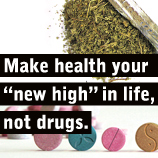 11 June 2013 - On 26 June, the world will commemorate the International Day against Drug Abuse and Illicit Trafficking, which serves as a reminder of the need to combat the problems to society posed by illicit drugs. UNODC has long been at the forefront of campaigns to raise awareness about the dangers of traditional drugs, such as cannabis, heroin, cocaine and amphetamine-type substances.
11 June 2013 - On 26 June, the world will commemorate the International Day against Drug Abuse and Illicit Trafficking, which serves as a reminder of the need to combat the problems to society posed by illicit drugs. UNODC has long been at the forefront of campaigns to raise awareness about the dangers of traditional drugs, such as cannabis, heroin, cocaine and amphetamine-type substances.
Today, however, there is an alarming new drug problem; demand has soared for substances not under international control. Therefore, the 2013 UNODC global awareness campaign "Make health your 'new high' in life, not drugs" aims to inform the public, and particularly young people, about the harmful effects of new psychoactive substances (NPS). Sold openly, including through the internet, these substances, which have not been tested for safety in humans, can be far more dangerous than traditional drugs.
Marketed as 'legal highs', "research chemicals", "plant food" and "bath salts," NPS are proliferating at an unprecedented rate. The use of these terms gives a semblance of legality misleading young people into believing that they are indulging in low-risk fun. Intentional mislabelling of some NPS as "not for human consumption" provides a way of evading drug control laws.
The sheer number of NPS arriving on the scene almost weekly compounded by the lack of understanding of the adverse effects and addictive potential of these uncontrolled substances presents a major public health challenge. Often, the difference between a 'safe' and toxic dose is marginal and NPS have been associated with fatalities, delirium and violent behaviour. Mixtures of NPS bought unknowingly by users have resulted in unpredictable and sometimes disastrous effects.
Everyone has a part to play in protecting the youth of the world from dangerous substances. UNODC leads the annual World Drug Campaign to drive home the message that illicit drugs pose a danger to society, aims to mobilize wide public support and seeks to inspire people to act against drug abuse.